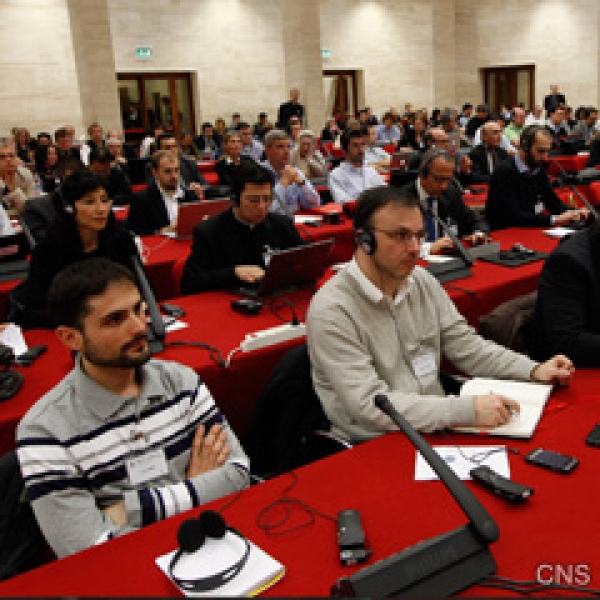For David Thurton, a journalism student entering his fourth year at Toronto’s Ryerson University, this was never a problem.
“To some extent, it’s kind of hard to get away from your Catholic identity,” said Thurton, who maintains a Facebook, Twitter and YouTube account for the Ryerson Catholic Chaplaincy Centre.
Even when using his own personal profiles on each of these sites, Thurton still lets his Catholic identity come through. As a journalist, Thurton has his own blog, and though it’s not explicitly Catholic, he is still communicating who he is to his readers.
“The world is changing,” he said. “But our values as Catholics… still apply in the digital communes and the digital space.”
Real life Catholicism also translates into online Catholicism for Franciscan blogger Friar Rick Riccioli, because for him, online is real life.
“(Remember) that Facebook is real,” said Riccioli, pastor at Toronto’s St. Bonaventure Church. “It’s not imaginary, it’s not virtual, it’s real people on there and what you say counts.”
Facebook and the online realm can be an invaluable extension of relationships in real life, Riccioli said. Through his Facebook and blog, he is able to connect with a greater amount of people, allowing him to spread his faith further than he would be able to without these means — a fact, he adds, that he thinks the Vatican doesn’t truly grasp.
“I think the Holy See is not on top of their game when it comes to the Internet,” he said. “They still think of the Internet and online blogs as brochures.”
Facebook and blogs are updated constantly, while brochures remain the same. The best proof of this, Riccioli said, is the Holy See’s own web site.
But Riccioli gives credit where credit is due. On May 2, the Vatican hosted a conference in Rome for 150 Catholic bloggers from around the world — a momentous step forward in “catching up.”
Salt + Light Television producer Pedro Guevara-Mann also thought the Pope’s message missed some of the benefits of the digital world, in particular, when the Pope criticized “the one-sidedness of the interaction, the tendency to communicate only some parts of one’s interior world, (and) the risk of constructing a false image of oneself.”
“I don’t know if the very nature of the Internet encourages people to be false,” said Guevara-Mann. “We have to remember that… it’s a tool.”
A tool that can be used well or poorly, he adds. Whether young people use the technology they have available to them for good or not is a question of maturity, according to Guevara-Mann. In that way, he said, “whether it’s on the Internet or in person… it’s the same thing.”
But Guevera-Mann doesn’t think the Vatican needs to do any “catching up” in the digital world.
“We get frustrated with how slow the Church is, but I’m impressed with how fast the Church is,” he said.
“The Church moves at the pace that the Church needs to move, and it’s never a second too early or a second too late because it moves with the Holy Spirit.”
World Communications Day targets Internet
By Luc Rinaldi, Catholic Register SpecialForty-five years ago, Pope Paul VI warned the Catholic world of “the vast and complex phenomenon of the modern means of social communication, such as the press, motion pictures, radio and television.”
To youth today, this caution may seem comical, yet it bears a striking resemblance to Pope Benedict XVI’s message for the 45th World Communications Day, which landed on June 5. This time, however, it’s all about the Internet.
“As with every other fruit of human ingenuity, the new communications’ technologies must be placed at the service of the integral good of the individual and of the whole of humanity,” said the Pope. “If used wisely, they can contribute to the satisfaction of the desire for meaning, truth and unity which remain the most profound aspirations of each human being.”
In his message, the Pope celebrated the benefits of modern digital communications like social networking and blogging, while heeding their shortcomings. And to youth, who are the most invested in digital communications, he extended a specific invitation to maintain a Catholic identity — even on the web.
Please support The Catholic Register
Unlike many media companies, The Catholic Register has never charged readers for access to the news and information on our website. We want to keep our award-winning journalism as widely available as possible. But we need your help.
For more than 125 years, The Register has been a trusted source of faith-based journalism. By making even a small donation you help ensure our future as an important voice in the Catholic Church. If you support the mission of Catholic journalism, please donate today. Thank you.
DONATE
